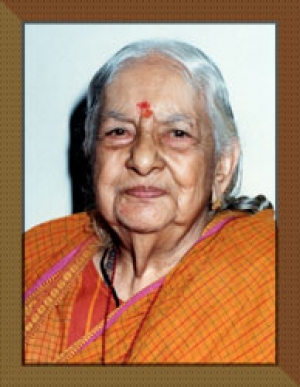Kamaladevi was married in 1917 to Krishna Rao when she was 14 years old. Two years later she was widowed. During this period she was still going to St. Mary’s School, where she completed her education in 1918. She then went onto Queen Mary’s College, Chennai, where she met and married (aged 20) the artist, poet and actor called Harindranath Chattopadhyay (Harin). This marriage went against contemporary Hindu practices with respect to widows remarrying.
Shortly after her marriage to Harin, they moved to London, where she attended Bedford College, University of London and received a diploma in Sociology. While in London they joined the Mahatma Gandhi’s non-cooperation movement (1920-1923) and later they went back to India. From this point onwards, Kamaladevi was deeply involved in training and organizing various political, especially women’s, movements, including running for the Madras (Chennai) provincial legislative assembly. Kamaladevi founded the All India Women’s Conference (AIWC) and became its first secretary.
In the following years AIWC became a national organization with branches throughout India and many voluntary programmes. In particular she became interested in handicrafts, especially textiles and embroidery, and their use to financially support groups and individual women. The independence of India from the British in 1947 and the resulting partition that created India, Pakistan and eventually Bangladesh, resulted in millions of refugees. Kamaladevi set up various Indian cooperative unions to help, including the setting up of Fairdabad (Delhi), which helped refugees from what was then the Northwest Frontier. This work developed into Kamaladevi actively preserving and reviving Indian handicrafts and textiles, in particular in the latter half of the twentieth century. In 1977, for example, UNESCO honoured her with an award for her work towards promoting Indian handicrafts. Kamaladevi published many books on a wide range of subjects, including politics, feministic studies, spiritual journeys, dance and theatre. In addition, she wrote or her work was used for:
- Indian Handicrafts, Bombay: Allied Publishers Pvt. Ltd., 1963.
- Indian Carpets and Floor Coverings, New Delhi: All India Handicrafts Board, 1974.
- Indian Embroidery, New Delhi: Wiley Eastern, 1977.
- Tribalism in India, Leiden: Brill Academic Pub., 1978.
- The Glory of Indian Handicrafts, New Delhi: Clarion Books, 1985.
- Handicrafts of India, New Delhi: Indian Council for Cultural Relations and New Age International Pub. Ltd., 1995.
- India’s Craft Tradition, New Delhi: Publications Division, Ministry of I & B. Govt. of India, 2000.
Wikipedia (retrieved 19 March 2017).
Digital source photograph (retrieved 19 March 2017).
GVE

